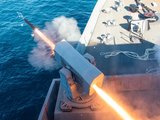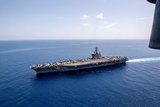Marine Armor Systems extends into global market
Following its success in Spain, Marine Armor Systems (MAS) has launched its portfolio of vessel protection systems globally to meet the needs of the international market. The company supplies a range of anti-piracy protective systems for ships and oil rigs operating in high risk areas such as Somalia, the Gulf of Aden and Guinea.
The company’s solutions include anti-pirate blockades, bunkers and armored citadels or safe rooms onboard, protecting crew with a bulletproof barrier in case of pirate boarding, in line with IMO recommendations. Its protective system is based on ballistic blinds, protecting the vessel or rig against pirate attacks and other potential threats such as armed robbery, terrorism and acts of sabotage.
Edurne del Río, Marine Amour System, said: ‘Following on from its significant success in Spain we are very proud to be launching MAS globally as a passive solution against the threat of piracy; providing protection to the lives of crew and the assets onboard ship.
‘In the event of a pirate attack response times onboard must be rapid. This is why we have developed a new automatic system which is designed to protect the whole vessel within ten seconds; at the push of a button.’
MAS is manufactured using kriptonia, a patented high-quality material stronger than steel, bullet proof and certified with an FB6 ballistic level to protect against military grade weapons, designed to protect the most vulnerable areas in any vessel or platform.
MAS manufacture, supply and install security hardening systems worldwide onshore or offshore. The system is hidden when not in use, requiring no storage space onboard.
More from Naval Warfare
-
![European navies line up $105.8 billion in unawarded contracts for 2026]()
European navies line up $105.8 billion in unawarded contracts for 2026
France, Germany and Italy lead the way on unawarded naval defence opportunities that could be awarded this year, but across Europe countries are ramping up their spending efforts to face geopolitical challenges.
-
![Spain’s F100 upgrade mirrors Aegis modernisation paths in allied navies]()
Spain’s F100 upgrade mirrors Aegis modernisation paths in allied navies
The Spanish Navy’s Alvaro de Bazan-class of air defence frigates will receive the latest Aegis Weapon System technology among other modernisations to extend the service life to 2045.
-
![UK’s Fleet Solid Support ship programme deemed on track despite steel supply concerns]()
UK’s Fleet Solid Support ship programme deemed on track despite steel supply concerns
Shipbuilders are saying the programme is going ahead on time as the government estimates 7.7 million tonnes of steel are needed for 2026 infrastructure projects.
-
![Raytheon unveils details of its proposal for the US Navy/NATO ESSM Next Significant Variant]()
Raytheon unveils details of its proposal for the US Navy/NATO ESSM Next Significant Variant
In an exclusive interview with Shephard, Raytheon’s VP of Shipboard Missiles disclosed what improvements the company plans to offer for the Sea Sparrow NSV.






















